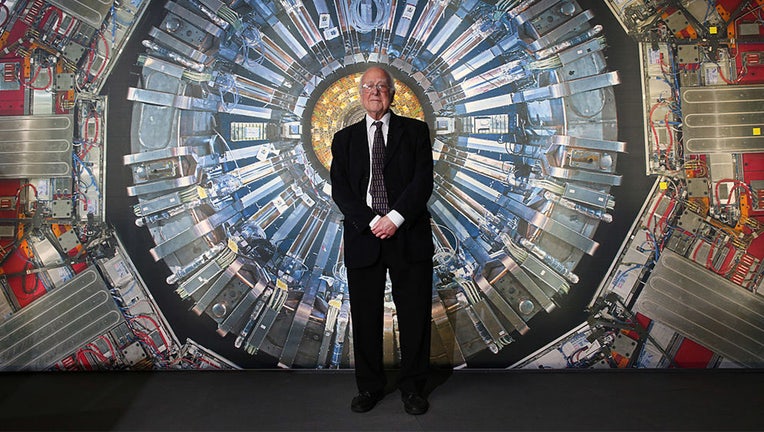Peter Higgs, physicist who theorized Higgs boson particle, dies at 94

FILE - Professor Peter Higgs stands in front of a photograph of the Large Hadron Collider at the Science Museum's 'Collider' exhibition on Nov. 12, 2013 in London, England. ( Peter Macdiarmid/Getty Images)
Nobel Prize winner and physicist, Peter Higgs, has died at age 94, according to a statement from the University of Edinburgh.
Higgs proposed the existence of the "God particle," also known as the Higgs boson particle, which helped explain how matter formed after the Big Bang.
"Peter Higgs was a remarkable individual – a truly gifted scientist whose vision and imagination have enriched our knowledge of the world that surrounds us. His pioneering work has motivated thousands of scientists, and his legacy will continue to inspire many more for generations to come," Prof. Sir Peter Mathieson said in a university statement released on Tuesday.
Higgs died on Monday "peacefully at his home following a short illness," the university said.
Higgs boson, the ‘God particle’
While Higgs proposed the existence of the Higgs boson particle in 1964, it wouldn’t be until 2012 when its existence was confirmed.
Higgs’ theory related to how subatomic particles that are the building blocks of matter get their mass. This theoretical understanding is a central part of the so-called Standard Model, which describes the physics of how the world is constructed.
Edinburgh University said his groundbreaking 1964 paper demonstrated how "elemental particles achieved mass through the existence of a new sub-atomic particle″ which became known as the Higgs boson.
In 2012, in one of the biggest breakthroughs in physics in decades, scientists at CERN, the European Organization for Nuclear Research, announced that they had finally found a Higgs boson using the $10 billion particle collider built in a 17-mile (27-kilometer) tunnel under the Swiss-French border.
Higgs won the 2013 Nobel Prize in Physics for his work, alongside Francois Englert of Belgium, who independently came up with the same theory.
Higgs’ work helps solve one of the most fundamental riddles of the universe: how the Big Bang created something out of nothing 13.7 billion years ago.
The Associated Press contributed to this report. This story was reported from Los Angeles.

